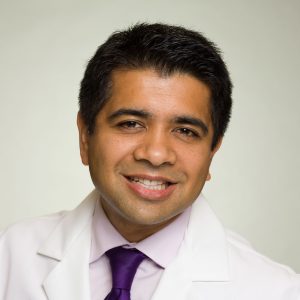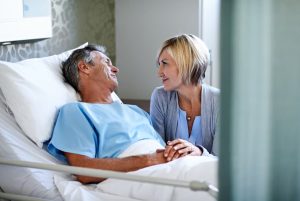
Balancing Service and Science: How Military Experience Shapes Dr. Avishek Kumar’s Approach to Cancer Care
For Avishek Kumar, MD, the journey into cancer care began with a deep family history of healthcare and took shape during his years of military
HIPAA Alert: Potential Data Breach Learn More
Questions on Oncology, Hematology and/or Infusion Clinical Services due to COVID-19 Crisis – CALL 833-698-1623
Important Information for Our Patients Regarding the Coronavirus.
RCCA Providing Area Cancer Patients with Access to Care During Coronavirus Outbreak
RCCA Offering Patients Virtual Visits During Coronavirus Pandemic
The imaging tests were negative, but Elizabeth Whalen knew something was wrong.
Having survived pancreatic cancer and breast cancer, the Cape May Court House resident was certain the pains she was experiencing represented more than indigestion, a pulled muscle, or some other minor complaint.
Still, the physicians at the urgent care center, her local hospital, and an academic medical center had not found anything amiss, nor had the computed tomography (CT) or magnetic resonance imaging (MRI) scans that those doctors ordered found signs of recurrent cancer.
Then came what, in retrospect, proved to be her lucky break – literally.

“I went to get out of the car, and I stepped on a stick, and I just twisted a little bit, but that twisting caused me to fracture a rib,” Ms. Whalen explains. Breaking a bone in such an unusual manner prompted her insurer to finally approve the positron emission tomography (PET) scan that it had refused to cover during earlier investigations of Ms. Whalen’s pain. The sophisticated imaging study revealed the bone had broken because it had been invaded and weakened by cancer cells – metastases from her breast cancer, which had returned and spread.
“All of the CT scans and MRIs they had done previously were just a few centimeters away from showing one of the tumors,” says Ms. Whalen.
The PET scan findings and resultant diagnosis of Stage 4 metastatic breast cancer came in 2022, just seven years after Ms. Whalen had undergone extensive surgery to treat her pancreatic cancer and four years after she had a mastectomy and subsequent treatment for her Stage 2 breast cancer.
So, what do you do when you’ve been diagnosed with cancer for the third time in seven years?
Well, if you’re an action-oriented, solutions-focused, tough-minded, life-loving woman from South Jersey, you get an exercise bike, pick a fight song, and make a plan.
Ms. Whalen explains, “The first thing I did after this last diagnosis was buy a Peloton and sign up for a 150-mile ride on the Peloton to support St. Jude’s Children’s Research Hospital. Unfortunately, I was only able to do 100 miles because I was on chemo, but I was still able to raise some money for St. Jude’s, which was important to me.” She adds that Carrie Underwood’s “Something in the Water” was one of the “fight songs” that kept her going on the bike and on her cancer journey.
“You have to have faith, and you also have to turn to family and friends. There are dark days, very dark days, and the nights can be even worse because you lay in bed and it’s quiet, and you don’t want your family to know how scared you are, and that’s when it comes crashing in,” Ms. Whalen says. She adds that while those feelings are natural, “You have to try to get that doubt, that negativity, out, and you have to try to have that positive attitude, that faith, that you’re going to be OK. You have to know it inside and out, and then you just have to make a plan and work it.”
Making a plan and seeing it through to fruition is nothing new for Ms. Whalen, who serves as Vice President of Learning and Development for an international construction consulting firm. A human resources executive by profession, Ms. Whalen was only a few months on the job with her employer in 2007 when she noted that there were “pockets of learning” at company offices all over the world. What was lacking, however, was an overarching structure to make ongoing professional education available to the firm’s engineers, project managers, and other key staffers no matter where they were located. Seeing a need, and an opportunity, Ms. Whalen created a “corporate university” offering a variety of courses designed to enhance the skills of employees in different roles and locations. The initiative has been so successful that the company’s courses have enabled numerous employees to obtain professional certifications from independent accrediting organizations that set rigorous standards for awarding credentials. In April 2025, OnConferences – a global membership organization of corporate executives – honored Ms. Whalen’s achievements by naming her one of the top 10 Learning and Development professionals in the world.
Making a plan for her breast cancer treatment included finding an alternative to traveling to the Philadelphia area to receive care at an academic medical center, as she had done for her pancreatic cancer and initial breast cancer. “There was no way that I was going to be able to do the chemotherapy regimen they wanted me to do and make that trip back and forth each day,” says Ms. Whalen, who grew up in the Cherry Hill area and raised her children there before she and her husband moved to Cape May County – their longtime vacation spot – in 2001.
When Ms. Whalen asked about obtaining treatment near her home, her Philadelphia-area oncologist recommended Hope Community Cancer Center and Dr. Julianne Childs. Shortly after she contacted RCCA’s Cape May Court House office, “Dr. Childs was on the phone with me, asking questions, providing encouragement, and making the arrangements to get my treatment started,” Ms. Whalen says. That treatment began with a grueling 12 rounds of chemotherapy per week. Today, almost three years later, it entails receiving a targeted treatment every 21 days at Hope Community Cancer Center and taking pills at home each day.
Regional Cancer Care Associates (RCCA) delivers cancer screening and testing at over 20 locations in New Jersey, Connecticut, Massachusetts, and the Washington, D.C., area.
“I’m so blessed that Hope Community Cancer Center is here, near my home, and I believe that I probably wouldn’t be here if it weren’t for Dr. Childs and her nurses and other staff. My cancer is Stage 4, meaning that it is incurable, but there has been no progression, and I attribute that to Dr. Childs. She’s a brilliant person, but what makes her different from other brilliant doctors is her empathy. She truly listens. Not all doctors pay close attention to what the patient is saying or accept that a patient knows his or her own body and should be believed when the patient says that something is wrong. Dr. Childs has that respect for the patient’s insights and situation. If I mention that I have sores in my mouth from the treatment, she gets me a prescription right away. At one point just after I finished my chemo, I was away, and I was bit by a tick. I texted her a photo showing a bullseye around the site of the bite and I had a prescription waiting for me before I got home. Her knowledge and her empathy are off the charts.”
The same instinct that drove her to respond to her own cancer diagnosis by raising funds for children with cancer prompted Ms. Whalen to draw on her experience to help others in her 4,100-strong company face their own battles with the disease. She developed and launched an enterprise-wide initiative that enables colleagues with cancer to support one another and share tips and best practices.
And what tips and best practices does the advocate of life-long learning have for other people dealing with cancer?
Ms. Whalen’s advice includes:
++++++++
Ms. Whalen’s doctor, Julianne W. Childs, DO, is a board-certified medical oncologist and hematologist who has practiced at Hope Community Cancer Center in Cape May Court House and Marmora, NJ, for more than 20 years. After receiving her medical degree from the University of Health Sciences in Kansas City, MO, Dr. Childs completed her internal medicine residency and hematology/oncology fellowship at the University of Medicine and Dentistry of New Jersey. Along with her Hope Community Cancer Center colleagues Kaleem Ahmad, MD; Hemang Dave, MD; and Fatima Fayyaz, MD, Dr. Childs is among 100+ medical oncologists and hematologists who practice with Regional Cancer Care Associates (RCCA), one of the nation’s largest networks of oncology specialists. RCCA has more than 20 locations across New Jersey, Connecticut, Massachusetts, and the Washington, D.C., area. RCCA’s cancer specialists see more than 30,000 new patients each year and provide care to more than 265,000 established patients, collaborating closely with those patients’ other physicians. RCCA physicians offer patients innovative therapies, including immunotherapies and targeted therapy, as well as access to approximately 300 clinical trials. In addition to serving patients who have solid tumors, blood-based cancers, and benign blood disorders, RCCA care centers also provide infusion services to people with a number of non-oncologic conditions—including multiple sclerosis, Crohn’s disease, asthma, iron-deficiency anemia, and rheumatoid arthritis—who take intravenously-administered medications.
To learn more about our comprehensive cancer care, call 844-346-7222 or contact RCCA today.
For more information or to schedule an appointment,
call 844-346-7222. You can also schedule an appointment by calling the RCCA location nearest you.

For Avishek Kumar, MD, the journey into cancer care began with a deep family history of healthcare and took shape during his years of military

Physical therapy is well known for its role in helping patients recover from sports injuries, surgeries, and orthopedic conditions. Many people may not realize that

Colon cancer is often treated with surgery, which can have a long recovery period. When patients understand what to expect, they feel more confident about

Regional Cancer Care Associates is one of fewer than 200 medical practices in the country selected to participate in the Oncology Care Model (OCM); a recent Medicare initiative aimed at improving care coordination and access to and quality of care for Medicare beneficiaries undergoing chemotherapy treatment.